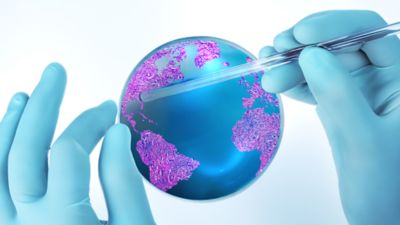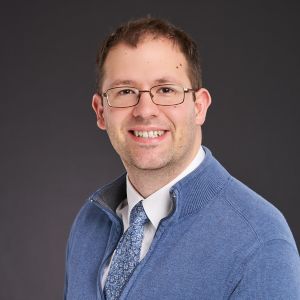St. Jude Family of Websites
Explore our cutting edge research, world-class patient care, career opportunities and more.
St. Jude Children's Research Hospital Home

- Fundraising
St. Jude Family of Websites
Explore our cutting edge research, world-class patient care, career opportunities and more.
St. Jude Children's Research Hospital Home

- Fundraising
St. Jude Global builds pathology and laboratory medicine capacity and community

An artistic rendering of the globe represented by histology, a primary tool used in pathology and laboratory medicine.
Imagine producers finding the perfect place to film a movie scene or chefs picking out the freshest ingredients to prepare later that night — these tasks are usually invisible but still essential. Often, the work that goes on behind the scenes of a project is as critical to success as the most visible aspects. A visit to the doctor’s office is no exception, with crucial behind-the-scenes work enabling safe and accurate patient care.
When a sample, such as a blood draw, is taken from a patient, it seems to disappear until results are presented. However, the work that goes into processing and understanding the information contained in that blood sample is essential to health care, even if it occurs where the patient can’t see it.
The people who ensure these tests and results are processed properly, promptly and with high accuracy are specialists in pathology and laboratory medicine. Pathologists and laboratory technicians handle samples and apply diagnostic tests. Such tests can detect infections, cancer progression, heart function and other medical issues. Few people consider the work that goes into pathology and laboratory medicine given the behind-the-scenes nature of the field, but these experts carry out the diagnostic testing that guides modern medicine.
“When you think about any kind of patient care, you can’t get very far without laboratory diagnostics,” said Randall Hayden, MD, St. Jude Global Pathology and Laboratory Medicine (GPLM) Transversal program director. “Making a laboratory diagnosis of an infection or measuring someone’s blood count or chemistry is necessary to care for patients appropriately. For example, when diagnosing tumors, if you don’t know which one it is, or if you get the wrong information, it could be catastrophic.”
Pathology and laboratory medicine around the world
Globally, access to both the expertise and equipment needed for pathology and laboratory medicine is inconsistent. To address this gap, St. Jude Global created the Pathology and Laboratory Medicine Transversal program. Through the program, St. Jude Global partners with hospitals worldwide to share expertise, build capacity and innovate new methods for pathology and laboratory medicine in countries where this essential behind-the-scenes work needs support.
“Our mission is to improve the care and outcomes of children with catastrophic diseases around the world through improvements in pathology and laboratory medicine,” said Alicia Rodriguez, St. Jude Global Pathology and Laboratory Medicine program manager. “Our vision is to enable accurate and timely diagnosis, which are both critical for good outcomes.”
The program has ongoing activities in several regions including Asia, Central and South America, the Eastern Mediterranean and Mexico. Each relationship is dedicated to finding practical and sustainable solutions that work in the local environment.
Partnering for better pathology
There is a primary challenge in pathology and laboratory medicine that is inherent to the discipline: diagnostics and other laboratory tests are expensive.
“Pathology and lab medicine require large capital costs, such as high-end microscopes or flow cytometers,” said Priya Kumar, MD, who leads the GPLM Hematopathology group. “Lower resource centers often don’t have that capital. My group’s mission is to try to help them do what we do, but without all the resources that we have, while maintaining diagnostic quality.”
To address those needs, the St. Jude team partners with local sites to see what solutions are practical and feasible while developing new approaches tailored to different settings.
“We do a lot of training and education at these sites,” Kumar said. “It could be process improvement, exploring what parts of their process could be improved or how it could it be standardized. We also help them create written protocols instead of depending on word of mouth.”
Process improvements can be cost-effective solutions with substantial impact but can require significant up-front work. For example, the partner and St. Jude may need to untangle supply chain issues for consumable products (such as pipettes or reagents) used in testing. This can include navigating tricky situations, such as when local laws or politics cause a supplier company to stop working with a particular hospital or, in some cases, entire countries.
Global reputation enables connection
St. Jude is known globally, with many long-term international relationships. Even before the GPLM Transversal program was established, St. Jude worked with health care facilities in other countries. That legacy of partnership lives on, paying dividends to this day.
“I was a part of one of those partnered institutions back in my home country,” said Teresa Santiago, MD, who leads the solid tumor team for the GPLM Transversal program. “So, I had already been engaged with that global program even from the other side. I know how impactful it can be to receive training and capacity-building assistance in countries with fewer opportunities and resources.”
Scientists and physicians from St. Jude listen to what the partner wants and needs from any collaboration. Then, when trust is built, they observe the situation to see what solutions are possible.
“St. Jude doesn’t just come in and provide answers,” Hayden explained. “We either provide education or a forum and means for sites to work with each other. Providing the network is sometimes just as important so people can see what others are doing in their country or region and work together to address their shared challenges.”
Sometimes, the solution is as simple as connecting people within the same institution.
“For a cerebral-spinal fluid (CSF) module in the Philippines, all they needed to do was create an electronic messaging group between the clinician doing the sample collection and the lab personnel,” Kumar said. “That way, it didn’t take hours for the CSF specimen to get to the lab, it just took a message with instructions to go get the sample. It improved both the speed and quality of their testing.”
On other occasions, the solution is to assemble a large group. Hayden, who also heads the microbiology portion of the program, is focused on creating such a collective.
“We hope to develop a longitudinal network and educational community focused on improving clinical microbiology, infectious disease, antimicrobial susceptibility testing and antimicrobial stewardship,” Hayden said.
Overcoming challenges to implementation
While St. Jude Global can help make connections and remove obstacles, there are often still challenges to surmount. Site staff must buy in to the plans. Changes in procedures require approval. Unexpected events, such as the COVID-19 pandemic, require navigation. One of the greatest challenges is the diversity of barriers the program faces.
“If you’re dealing with a government institution, it’s completely different from a nonprofit,” Santiago explained. “If a hospital relies on a private lab, you have little control. Or a lab could rely on a single pathologist, which is very different from a larger enterprise with multiple people.”
Additionally, standards and practices for pathology and laboratory medicine are not uniform internationally.
“We provide training programs specifically for pathology, but some countries may not have that subspecialty,” Kumar added. “What we can do depends on the specific circumstances of each site.” Solutions are tailored to each individual partner’s needs. The process can be slow; therefore, the program attempts to find sustainable solutions. This focus on long-term sustainability can require creative problem-solving but ultimately allows partners to function independently.
“We often hear about state-of-the-art machines that have been donated, but if the sites don’t have the money for the consumables, it won’t help,” Santiago said. “We want to help our partners become independent and proficient in any solution.”
Another way the program addresses sustainability is by creating digital training materials.
“We help build and maintain web-based applications and initiatives that increase training and capacity building locally and regionally,” Santiago said. “The reach that we now have with these materials is amazing. We can interact with many countries around the world to have an exponential impact on the future of global pathology.”
Expanding global pathology and laboratory medicine
The Pathology and Laboratory Medicine program is one of the newest St. Jude Global Transversal programs. Each is dedicated to a different aspect of medicine, harnessing the expertise of St. Jude Global teams to improve standards of care and train practitioners worldwide. The efforts may be invisible from the view of most patients, but the effects are not.
“We are rapidly gaining ground and scaling our successful efforts,” Hayden said. “Though we are currently in the early stages, our joint initiatives are great examples of where we are heading and what we can do together with our partners.”






